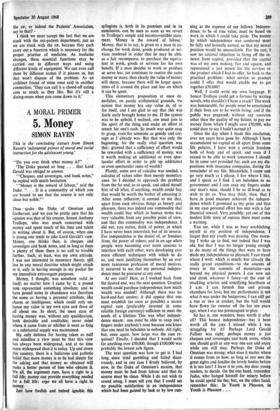Slow service
MEDICINE JOHN ROWAN WILSON
The Ministry of Health is growing a little concerned about out-patients. The word has got around that patients are having to wait rather a long time, both to get appointments to attend the hospital and to see the doctor when they actually get there. The Patients' Association has complained to the Department of Employ- ment and Productivity that manpower and productivity are being wasted by all this hang- ing about. Mrs Castle has presumably had a sharp word with Mr Robinson about it, and there is now to be a full-scale inquiry to find out what is going on.
Delay in out-patients is a chronic disease which has so far proved extremely resistant to treatment. The form in which it occurs has changed during the last two decades. When I was a student the scene in the average teach- ing hospital out-patient department was like something out of the Inferno. The whole batch of patients for an entire afternoon turned up at half-past one and waited there until the doctor was able to see them, which might easily be as late as six or seven in the evening. People camped out on the long, hard benches, gossiping, complaining, eating, and occasion- ally dozing off. The air was full of cries of screaming children and the smell of sick humanity. Sisters and doctors had to force their way through the crowd whenever they passed from one department to another. Everywhere there was an atmosphere of chaos, delay, in- dignity and ill-temper. It was like waiting for an internal flight on Aeroflot.
With the coming of the health service one of the first priorities was the removal of this relic of the Victorian charity ward. Appoint- ments systems were introduced and the crowds vanished. The doctors saw only the number of patients they could manage within the three hours of the session, and patients were given cards to come up at intervals of quarter or half an hour or whatever was considered appro- priate. The system didn't work absolutely smoothly, of course. It isn't possible to say exactly how long patients will take to examine. If the doctor makes his margin narrow he is likely to get delayed over a particularly diffi- cult case and run late throughout the whole afternoon. If he makes it wide he has to wait between patients, which means that his work- ing efficiency is lower than it should be.
And what about the mass of patients who are no longer crowding the out-patient hall? They haven't escaped waiting, I'm afraid. They just don't get an appointment until their turn comes up on the list, which may not be for a couple of months or so. This is the situation which the Patients' Association is complaining about at the moment.
It seems unlikely that it will be possible to dispose of out-patient delays entirely, since the demand is irregular in volume; to see every patient within a day or two, all the year -round, would mean a very lavish increase in accom- modation and a large staff who would for much of their time be inefficiently employed. How- ever, there are a number of things which could be done to improve the situation. Better- planned buildings, more efficient handling of records, and more scientific management of patient flow by elimination of bottlenecks are obvious examples. Action might also be taken to correct personal deficiencies on the part of both administrative and medical staff. It is reasonable to expect hospitals to exert some control over unpunctual consultants as well as offhand and incompetent clerks.
A more radical approach to the problem has been suggested in a recent report from the Nuffield Hospitals Trust (Gateway or Divid- ing Line? A Study of Hospital Out-patients in the 1960s OUP 21s). The authors, Gordon Forsyth and Professor Robert Logan, believe that the whole concept of out-patients ought to be reconsidered. They point out that many referrals to out-patients occur because this is the only way in which a patient can be admitted to a hospital bed. For many common com- plaints, the GP and the consultant are in agree- ment about the diagnosis and the examination at out-patients becomes a pure formality. The suggestion is made that the GP's diagnosis might be accepted by the consultant and the patient put on the waiting list for admission at the GP's request.
This sounds attractive on the surface. I do not think it would be workable in practice. A GP and a consultant might well agree on the diagnosis but not agree as to whether the patient should be treated by admission to hos- pital. One can imagine the case of a patient who is put on the waiting list of a hospital to have an operation on his varicose veins. He waits perhaps two years before his turn comes up. On admission to hospital the surgeon looks at him and says, 'I'm afraid I disagree with your doctor. I think your veins are un- suitable for operation.' What would the patient, the GP, or indeed the Patients' Association, say to that? - I think we must accept the fact that we are stuck with the out-patient department, just as we are stuck with the GP, because they each carry out a function which is necessary for the proper practice of medicine. As medicine changes, these essential functions may be carried out in different ways and using different kinds of equipment. We can even call them by different names if it pleases us, but that won't dispose of the problem. As an architect friend of mine once said in another connection, 'They can call it a closed-off eating area as much as they like. But it's still a dining-room when you come down to it.'



































 Previous page
Previous page